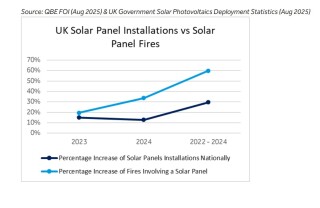This post was originally published on this site
https://www.theconstructionindex.co.uk/assets/news_articles/2025/11/1762241756_solar-panels-leopictures-from-pixabay.jpgNew research from business insurer QBE reveals UK fire services faced a fire involving a solar panel once almost every two days in 2024, marking a 60% increase in the past two years.
Data collected by QBE from freedom of information (FoI) requests to UK fire services in August 2025 also reveal that fires are rising faster than the rate of installations, which could indicate incorrect installation or maintenance.
The findings come as the UK sees record levels of solar panel installations, driven by commercial demand and government net-zero incentives. As of August 2025, there were 1,834,584 solar panels installed across the UK.
Adrian Simmonds, practice leader for property risk solutions at QBE Insurance, said: “Solar technology is an essential part of the UK’s clean energy transition, but the rapid pace of deployment is cause for concern for risk management. Our analysis shows fires involving solar panel fires have risen at twice the rate of new installations over the past two years. Safe solar panel installation and maintenance are essential to reducing fires.”

QBE received responses from 37 of the 49 fire services nationwide. These 37 fire services dealt with 151 solar panel fires in 2024, suggesting that the real total is more like 200 incidences, had all fire services replied.
Of the 151 fires, 97 were on residential buildings, 27 on commercial properties, 17 on solar farms and 10 on industrial buildings.
Improper installation was a frequent cause, with loose connections, damaged wires or faulty wiring leading to arc faults or other electrical issues. Other factors include component defects, high current, and external factors such as moisture, extreme weather, and dirt or foliage on the panels.

The FoI data suggests that the majority of fires originate in the inverter or on the solar panels themselves. The inverter is the hardest-working component in a solar panel system, prone to failure if installed incorrectly or poorly maintained. It generates significant heat, meaning poor ventilation, dust build-up, or blocked cooling systems can quickly elevate fire risks. Solar panel inverters can be positioned indoors and outdoors, but there should be no obstruction, good ventilation and timely replacement.
A growing concern is also the rapid adoption of lithium-ion batteries in new solar installations.
Adrian Simmonds said: “Most new domestic and commercial systems now include battery storage, introducing additional fire risks when units are installed in lofts, airing cupboards or upper-floor spaces that are difficult to access in an emergency. Combined with limited inspection and cleaning, these installations increase the likelihood and potential severity of fires.”
In 2024 the UK fire services tended to 1,330 lithium-ion battery fires. QBE said that it expects that, as lithium-ion battery use expands, battery units could soon become a leading source of fires linked to solar panel systems.
Simmonds noted that extreme weather conditions could further exacerbate these risks. “Roofs and panels should be inspected after storms or high winds, as even minor dislodgement or debris can increase fire risk,” he said.
Systems are typically designed to withstand speeds of up to 120 miles per hour, yet recent storms such as Storm Ashley have exceeded this threshold. High winds can lift up panels or expose cabling, while hail, dust and prolonged heat can damage surfaces and insulation. Property owners should therefore apply “one-in-100-year” criteria at the design stage and carry out roof inspections following major storms, hail or flooding, he said.
Simmonds concluded: “We strongly encourage property owners to carry out formal risk assessments, engage certified installers, and ensure regular inspections and cleaning. These simple steps can significantly reduce the chance of fire.”
Got a story? Email [email protected]


![Solar panels [Leopictures from Pixabay]](https://tradeassociation.org.uk/wp-content/uploads/2025/11/750x500_top_1762241756_solar-panels-leopictures-from-pixabay.jpg)